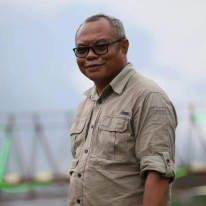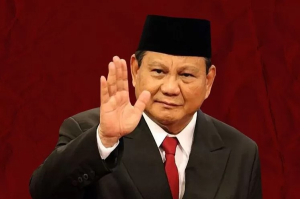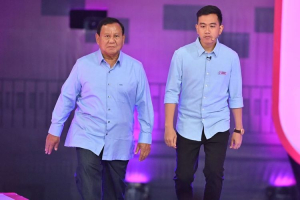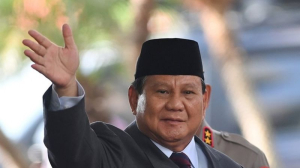Prabowo ought to pave his own path, outstrip the bar set by his forerunner
Today, October 20, 2024, seven months after the General Elections Commission (KPU) anounced the results of the February 14 presidential election, General (ret.) Prabowo Subianto is inaugurated as the country’s President along with his election running mate Gibran Rakabuming Raka as Vice President.
Prabowo is Indonesia’s eighth president ever since the country delared independence in 1945 or the third president ever since direct presidential election was introduced in 2004. His election victory is indeed a superb achievement for Prabowo as he secured the country’s top executive post in his third attempt after losing the previous 2014 and 2019 presidential elections.
There has never been any candidate attempting to get elected as the country’s president in his or her third attempt, except Prabowo. Others decided to stop after losing in their second attempts.
Prabowo’s rise to the country’s top leadership comes at the time when his predecessor − Joko “Jokowi” Widodo − is at one of his best moments of presidency as the outgoing president had been enjoying high approval rating at around 80 percent even when he is about to leave office, which is obviously the highest ever approval rating globally a president could have.
Jokowi’s high approval rating was apparently one of the main reasons for Prabowo to join forces with the country’s 7th president since the beginning of Jokowi’s second five-year term of presidency in 2019. It’s true that it was Jokowi who invited Prabowo to join his 2019-2024 Cabinet as Defense Minister. But as analysts and Prabowo’s advisors have suggested, Prabowo’s decision and public declaration that he is a strong supporter of Jokowi and would like to continue Jokowi’s “development programs” ever since he declared his intention to again contest the presidential election of the 2024 edition was apparently the decisive factor in his 2024 election victory.
Prabowo lost his first and second attempts for presidency to the same person − Jokowi. Pairing with Hatta Rajasa, he lost 46.85 percent-53.15 percent in the 2014 election against Jokowi, who paired with Jusuf Kalla. Pairing with Sandiaga Salahuddin Uno, Prabowo again lost 44.50 percent-55.50 percent against Jokowi, who then paired with Ma’ruf Amin, in the subsequent 2019 election.
Apparently learning from his double defeat to Jokowi, as some aides have suggested, Prabowo took a bold step requesting Gibran, who is also the eldest son of Jokowi, to be his running mate in the February 14 election. The logic is simple that Prabowo would like to draw a significant percentage of Jokowi’s loyalists to vote for him and contribute for an increase in the number of votes he managed to secure so that he can win the election in one round of voting and thus avoid a runoff election.
Now that he is President of the Republic of Indonesia, Prabowo cannot just rely on his election campaign jargon of being “a loyalist and successor to Jokowi's development policies” in running his government, especially if he has the intention of seeking reelection in the 2029 presidential election.
It is the time for Prabowo to pave his own path in State leadership, moving away from the shade of Joko Widodo. It is not enough for Prabowo to just match Jokowi’s achievement as the outgoing president has set a high bar for Prabowo to outstrip.
Jokowi, whose presidency had been characterized by his focus on infrastructure development, social welfare programs and economic growth, has overseen a period of remarkably stable growth of 5 percent each year of his term, except in 2020 when the Indonesian economy contracted as a result of the global pandemic.
Jokowi is also considered to have fared quite well on the economic front, as evident in the widespread recognition both domestically and internationally although his promise to accelerate growth by 7 percent during the presidential campaign back in 2014 had never come true.
Similarly, he has pushed for signature projects like the Jakarta-Bandung high-speed rail, the construction of the new capital city in Penajam Paser Utara regency in East Kalimantan following the House of Representatives’ (DPR) approval to relocate the capital city from Jakarta, as well as other infrastructure projects to improve connectivity, which will sap much of the state budget.
Continuing Jokowi’s iconic projects, like the new Capital City development, toll roads and infrastructure across the country, is indeed a must for Prabowo not only because those projects worth trillions of rupiah that that are too big to fail, but also their success is a necessity in order to realize the Golden Indonesia 2045 Vision of President Jokowi, which has also been the commitment of Prabowo himself.
To make him different from or even better than Jokowi, Prabowo could push for complete settlement of past cases of human rights violation, a feat that previous presidents, including Jokowi, had failed to do. Prabowo can also do better than his predecessor in combating the rampant corruption cases in the country, by among others playing a pivotal role in restoring the dignity and honor of the Corruption Eradication Commission (KPK) after a series of cases of ethical and legal violations implicated against its law enforcers, including its Chief commissioner.
Prabowo can also do better than Jokowi in international diplomacy, particularly in presenting a more assertive voice and stance, and perhaps playing a leading role in contributing for the settlement of crises in various parts of the world.
Those are not easy tasks for the new president to perform. But, they are not impossible to achieve, either.
− The Editor
Already have an account? Sign In
-
Start reading
Freemium
-
Monthly Subscription
30% OFF$26.03
$37.19/MonthCancel anytime
This offer is open to all new subscribers!
Subscribe now -
Yearly Subscription
33% OFF$228.13
$340.5/YearCancel anytime
This offer is open to all new subscribers!
Subscribe now






